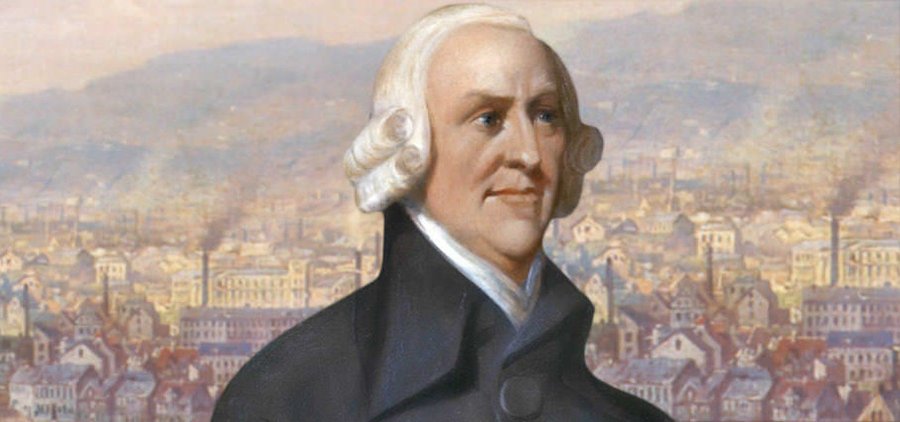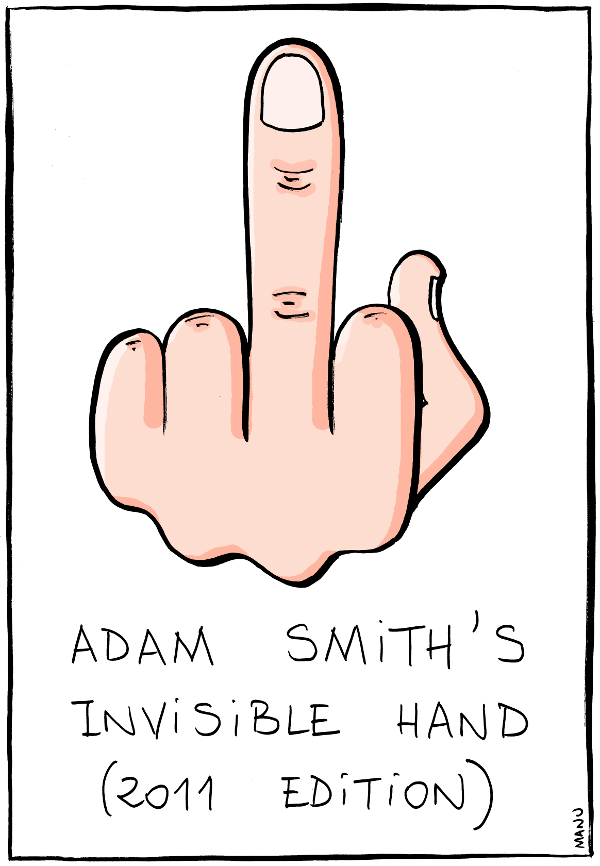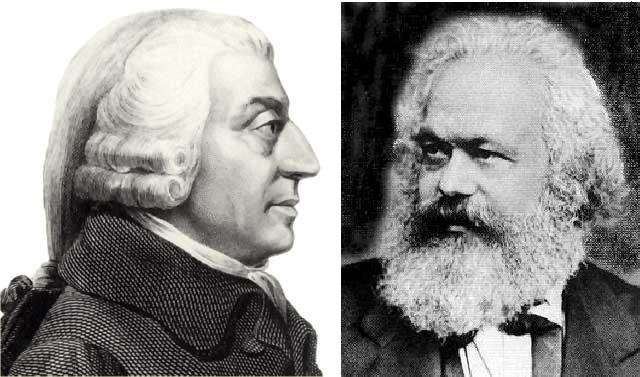There most certainly is NOT!! It baffles me time and time again how many plain lies and misconceptions are deeply ingrained in our collective consciousness. Let's go look together for this magical, equilibrium creating hand...

Adam Smith. source: Foundation for Economic Education
If I want to know what this "invisible hand" is, I look for it on Google and type "what is the invisible hand". Affter the obligatory Wikipedia and Investopedia results, the first relevant hit on number 3 is an article by The Economic Times, and it's just what I'm looking for. Let's see what it says:
Definition: The unobservable market force that helps the demand and supply of goods in a free market to reach equilibrium automatically is the invisible hand.
Well, that's a good start: it is exactly what everybody tells me when talking about the markets failing. They blame it on too much government intervention; if they just "let the market do it's work" and "don't hinder free trade with taxation or trade regulations", everybody will get what's truly theirs. Just let demand and supply do their work, and the equilibrium would kick in as if by magic...
This is so sad in my mind: how could anyone believe this? This market we're talking about is based on ownership and that in itself ends the "free" portion of this market. There has never been and there will never be a free market, or a free (anarchist) society, as regulations begin with ownership! Ownership itself is a legal construct, for Peet's sake...
But that's not even the point here. The article continues:
Description: The phrase invisible hand was introduced by Adam Smith in his book 'The Wealth of Nations'. He assumed that an economy can work well in a free market scenario where everyone will work for his/her own interest.
He explained that an economy will comparatively work and function well if the government will leave people alone to buy and sell freely among themselves.
Does this sound familiar? I thought so. But why do you believe it? Why do you believe that in a system that's based on the increasing of private ownership through competing with only one's own interests in mind, there will somehow be any type of balance? I can only see that the most callous greedy egotistical bastards will be most successful in this system. It can only end in a plutocracy, as it has in our times as well.
I say "as well" because all great empires in the past died on the same note, and they all professed their own version of capitalism. You all know the saying "history is written by the victors", right? And you all understand this to be factual, right..? Right? Okay, well then this must also be true for that one, everlasting war, the war between the classes. Not only the history about the clashes between peoples and nations (which also really are just clashes between the uppermost class of one nation trying to get something from the uppermost class of another nation), but all of our histories have been written by those victors.
I said it before, and I'll repeat it here: no conspiracy theories are needed to explain the deplorable state of justice and humanity in the world today; it's all that's allowed by the ruling plutocracy. Forget the Illuminati and the infamous family names that are tied to them: they may be true, they may not be true, but they're ultimately unnecessary and detract from the simple causes, open for anyone to see, in the economy.

source: ConservationBytes.com
Back to the matter at hand. This article is a prime example of general believe, of today's market-dogma. But it is a lie. Smith did not introduce The Invisible Hand in "The Wealth of Nations", the free-market bible. He first mentioned the phrase in a much earlier book, "The Theory of Moral Sentiments", in which he most certainly did not describe it as some unseen force that guides markets.
The book starts with this:
How selfish soever man may be supposed, there are evidently some principles in his nature, which interest him in the fortunes of others, and render their happiness necessary to him, though he derives nothing from it, except the pleasure of seeing it. Of this kind is pity or compassion, the emotion we feel for the misery of others, when we either see it, or are made to conceive it in a very lively manner. That we often derive sorrow from the sorrows of others, is a matter of fact too obvious to require any instances to prove it; for this sentiment, like all the other original passions of human nature, is by no means confined to the virtuous or the humane, though they perhaps may feel it with the most exquisite sensibility. The greatest ruffian, the most hardened violator of the laws of society, is not altogether without it.
Also this book is known as "the ethical, philosophical, psychological, and methodological underpinnings to Smith's later works, including The Wealth of Nations (1776).". To be clear: Smith believed that every man has empathy and acts upon that. That's all this is saying, and it is the basis for what he had to say about the invisible hand later in this book and later books:
[The rich] consume little more than the poor, and in spite of their natural selfishness and rapacity…they divide with the poor the produce of all their improvements. They are led by an invisible hand to make nearly the same distribution of the necessaries of life, which would have been made, had the earth been divided into equal portions among all its inhabitants, and thus without intending it, without knowing it, advance the interest of the society, and afford means to the multiplication of the species.
Now, just to make sure you know where the grandfather of capitalism really came from, an excerpt from The Adam Smith Institute:
The Theory Of Moral Sentiments was a real scientific breakthrough. It shows that our moral ideas and actions are a product of our very nature as social creatures. It argues that this social psychology is a better guide to moral action than is reason. It identifies the basic rules of prudence and justice that are needed for society to survive, and explains the additional, beneficent, actions that enable it to flourish.
Self-interest and sympathy. As individuals, we have a natural tendency to look after ourselves. That is merely prudence. And yet as social creatures, explains Smith, we are also endowed with a natural sympathy – today we would say empathy – towards others. When we see others distressed or happy, we feel for them – albeit less strongly. Likewise, others seek our empathy and feel for us. When their feelings are particularly strong, empathy prompts them to restrain their emotions so as to bring them into line with our, less intense reactions. Gradually, as we grow from childhood to adulthood, we each learn what is and is not acceptable to other people. Morality stems from our social nature.
See, what's happened there? This Invisible Hand, he attributed to the behavior of the owners of the means of production; they would be guided by this hand, not the markets. And the guidance he's talking about is simply an appeal to their moral values. Well... Did this appeal come into realization? Are our richest acting in such a way that indicates their moral need to provide for all?
Also, realize that Smith was very well aware of all the other dangers that came with capitalist fundamentals like "the division of labor"; he warned us that large parts of society would get dumb down by this and that this in turn would damage the workings of any democracy. It's funny: Smith and Marx agreed on so many things, but the Plutocrats manage to make us believe only in their disagreements and, like in any war-propaganda, inflated both sides. Divide and Rule still works...

"Karl Marx and Adam Smith – each in his own time – both considered that it is the workers not the bosses/capitalists who produce value." source: Links International Journal of Socialist Renewal
As The Invisible Hand is based on an untruthful interpretation of Adam Smith's brilliant writing, so is the notion that "greed is good" based on a complete misinterpretation of Darwin's "survival of the fittest"... But this rant, and is is a rant, as I'm getting sick and tired of people praising the system that's keeping them down, has gone on long enough. Like I said, I'm in very busy times right now, so can't always properly prepare stuff...
If you made it this far though, I'm grateful, as always, for your attention and continued support. Please feel free to discuss in the comments section; I'll honestly try to respond to all of them, but cannot make any promises this time. I can only hope you're willing to forgive me if I can't...

Recent articles you might be interested in:

Thanks for stopping by and reading. If you really liked this content, if you disagree (or if you do agree), please leave a comment. Of course, upvotes, follows, resteems are all greatly appreciated, but nothing brings me and you more growth than sharing our ideas. It's what Steemit is made for!


Just for Full Disclosure, I'm invested in these crypto-currencies:
Bitcoin | Litecoin | EOS | OmiseGo | FunFair | KIN | Pillar | DENT | Polymath | XDCE | 0x | Decred | Ethereum | Carmel | XYO
